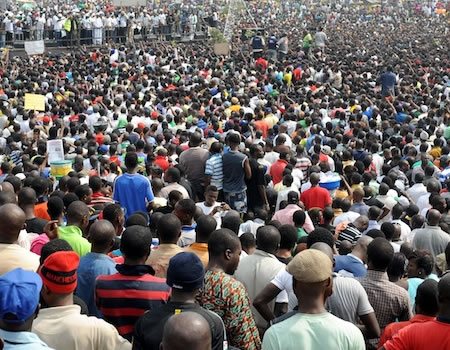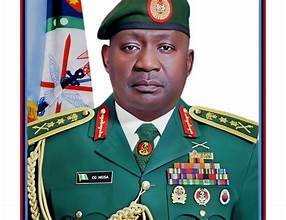Rigged prosperity: How 133 million Nigerians languish in poverty —Experts
[ad_1]
NIGERIA is a wealthy nation endowed with some of the best natural resources that can be found anywhere in the world, but four out of every 10 Nigerian live below a dollar per day due to mismanagement of government revenues and concentration of riches in the hand of a few individuals which experts have tagged “rigged prosperity.”
While the federal and state governments are pointing fingers at each other on which is perpetuating poverty on the land, a herd of economic and finance experts have blamed both tiers of government as well as corrupt practices perpetrated by some highly connected Nigerians as the underlying causes of poverty in the country.
In its latest National Multidimensional Poverty Index report launched recently, the National Bureau of Statistics (NBS) said that 63 per cent of Nigerians were poor due to a lack of access to health, education, living standards, employment and security.
The Multidimensional Poverty Index offers a multivariate form of poverty assessment, identifying deprivations across health, education, living standards, work and shocks.
On his part, the former Director-General, Lagos Chamber of Commerce and Industry (LCCI), Dr Muda Yusuf, said the social investment programmes of the government are not addressing systemic issues.
According to him: “Government is not addressing policy and structural issues, which are contributing to the widespread poverty.
“Look at the total number of people who have been directly impacted by these social investment programmes. I am not sure they are up to two million, compared to 133 million living in poverty. You can’t solve this scale of the problem with that kind of intervention.”
Yusuf, who is the founder/ CEO, Centre for the Promotion of Private Enterprise (CPPE), said interventions cannot solve insecurity or infrastructure problems, making life difficult for small business owners, nor can it solve the problem of inflation eroding the purchasing power of people and making people poorer.
A renowned investment banker, economist and founder of Stanbic IBTC, Atedo Peterside, in his own view, identified oil theft and other fraudulent activities surrounding fuel subsidy and foreign exchange as the three points of “rigged prosperity” where the well-connected impoverish many Nigerians as a result of poor institutional oversight.
“What we have now is rigged prosperity where a few benefit from the system to the detriment of others. To achieve shared prosperity, we must address market distortions and government should not constitute an im- pediment to progress,” Peterside stated.
At a plenary session of the Nigerian Economic Summit held in Abuja, Peterside had said the intersection of a few criminals in governments is what leads to some of these biggest problems.
“You see, rigged prosperity is the cause of poverty for many because what happens is that when we take serious economic policy issues and you allow a few people to rig them in a way that it benefits them, but to the detriment of millions of Nigerians, then what you have is very few people become very rich and millions of people become very poor, and it’s unnecessary,” he said.
Addressing the issue of oil theft, he said it takes a well-connected person to get away with the huge amount of oil being recorded as stolen in Nigeria.
He added, “So what kind of person can bring a ship to Nigeria to load crude oil if he does not have friends in governments? Should I talk about criminals in government together?”
Speaking on foreign exchange, Mr Peterside said there are less than one million Nigerians out of over 200 million who presently have access to foreign exchange at the official rate.
“Have the right parentage and the right connection; get a chance to make a fortune. And it is worse than that because the cost of foreign exchange policy is not something that is understood.
“Sometimes, (it’s) because the playing field is not level. Let’s imagine there are three of us in the same business, but I have the right parentage, if I get foreign exchange at N450/$ I may get impatient and sell my goods at N550/$ to N650/$; the other two people with poorer parents have to buy at the parallel market. My activities can bankrupt them,” he said.
Mr Peterside said there are Nigerians recording losses and going out of business, not because they are inefficient, but because an inefficient but well-connected businessman enters their space and they cannot compete with him.
However, there is widespread disaffection among some stakeholders who blame state governments for the level of poverty in Nigeria, because while thousands of retired civil servants across Nigeria who laboured for their states for 35 years wallow in abject penury and die without getting their pensions and other entitlements; and while many serving civil servants go without pay for upwards of 10 months, former state governors (since 1999) who spent maximum of eight years in office are swimming in millions of taxpayers’ naira carted away monthly in form of pensions, leaving most of the states’ coffers empty.
Nigerian Tribune had earlier reported that in the face of rising cost of food items in Nigeria, civil servants in Abia, Ondo, Taraba and other states were not paid remuneration. Without a doubt, many state governments are currently battling with the inability to meet up with salary obligations, alongside rising debt, interest rates and inflation.
Available records show that the annual pension allowances of ex-governors, excluding other humongous allowances, vary from state to state and range from N5.5 million to as high as N300 million depending on how rich the state is, the number of ex-governors and the audacity of a sitting governor to influence the state legislature to enact pension laws that protect his/her interest after office.
In-between these two extremes are other no less mind-blowing figures as N6.6 million, N8.8 million, N30 million and N200 million.
For instance, in the twilight of his eight-year tenure as governor of oil-rich Akwa Ibom State, Godswill Akpabio, in 2014, signed a law that provides N200 million as annual disbursement to former governors and a pension for life at a rate equivalent to the salary of the incumbent governor.
The law also provides for free medical services for each ex-governor and spouse at an amount not exceeding N100 million per annum, a new official car and a utility vehicle every four years, one personal aide, a cook, chauffeurs and security guards at a sum not exceeding N5 million per month and N2.5 million. In his reaction, a member of President Muhammadu Buhari’s Economic Advisory Council and Managing Director/Chief Executive Officer of Financial Derivatives Company Limited, Mr Bismarck Rewane, listed other causes of poverty, which he said is concentrated and worsening in the north-east and northwest zones.
He said the Misery Index in Nigeria is at 49 percent, worsened by inflation and unemployment levels.
“Public outrage is beginning to manifest. All economic agents currently feeling the revenue squeeze. Life Expectancy: 55.8 years – death toll rising on bad living conditions and insecurity. Dilapidated health care system and sharp rise in brain drain increasing mortality rates,” he stated.
According to him, the state government finances are dwindling and debts are rising.
“The state of insecurity in the country had already compounded fear as well as the country’s economic woes.
“Deteriorating social conditions leading to high insecurity and crime rates, kidnapping and ransom; Bus Rapid Transports (BRTs) and commercial vehicles are unsafe; train bombings now a reality, and Boko Haram activities spreading to central Nigeria,” he stated.
“Inflation eroding the real value of minimum wage. Household income further depressed. Nigerian consumers are pushed to the wall. Nigerians are now buying less in quantity and lower quality.
“Real income of fixed income earners fall in the face of rising price level. Real income rapidly eroding with salary cuts and layoffs imminent. Nigeria still the poverty capital of the world as over 40 per cent of total population live in extreme poverty and four in every 10 Nigeri- ans live below a dollar per day (World Bank).”
Also, a businessman and founder of former Diamond Bank, Pascal Dozie, believes that Nigeria must build a nation that works for all, based on effective constitution, laws and policies.
Quoting Thomas Jefferson who said ‘the two enemies of the people are criminals and government,” he added that “We must tie the second down with the chains of the constitution so that it will not become the legalised version of the first.”
The economists, who spoke against the backdrop of the recent MPI report, said what the government has been doing is palliative and does not address the fundamental causes of poverty. From the survey, 62.9 per cent or 132.9 million Nigerians are multidimensionally poor (a 60.3 per cent increase from 82.9 million people in 2019). This implies deprivations in more than one of the four-dimensional areas or in at least 36 per cent of the weighted indicators. Noteworthy, multidimensional poverty is higher in rural areas where 72 per cent (106.0 million people) are poor, compared to 42.0 per cent (26.9 million people) in urban areas.
In terms of the geographical distribution of the multidimensionally poor population, 65 per cent (86 million people) live in the North, while the balance, 35.0 per cent (47 million people) are from the South. Of the 15 indicator measures, deprivations in the time to healthcare (12.6 per cent), food insecurity (12.5 per cent) and school attendance (9.6 per cent) combined contributed the largest share, 34.7 per cent, to the dismal national MPI reading of 0.257 (2016: 0.225).
By adding a fifth dimension, child survival and development, to the general MPI to assess the level of multi-dimensional poverty among children aged 0-17 years, the index reading worsened to 0.282, given that 67.5 per cent of children (67.3 million children) are trapped in the web of multidimensional poverty.
ALSO READ FROM NIGERIAN TRIBUNE
[ad_2]















Post Comment